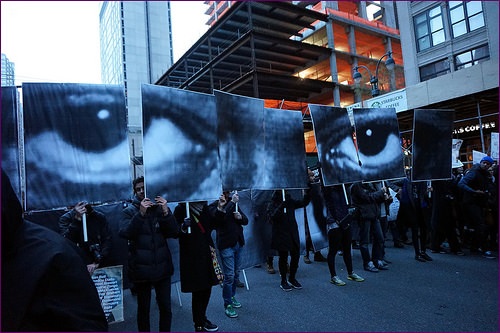
Image Credit: March for justice for victims of police violence, The All Night Images
It might have been hard to discern amidst the political grandstanding of some members of Congress earlier this week, but the House Judiciary Committee actually held a hearing on the problems of policing that have been linked to the unnecessary deaths of too many young black men—and one is too many. Rep. Luis Gutiérrez (D-IL) has been calling for a House hearing on the issue since the death of Trayvon Martin at the hands of a neighborhood vigilante.
Although there were nonprofits and academics who actually testified before the committee, press coverage focused on the appearance of Sheriff David Clarke, Jr., from the Milwaukee County Sheriff’s Office and on the antics of some committee members.
Clarke’s appearance alone would have been sufficient to reduce the hearing beneath any semblance of seriousness. Earlier this month, on May 11th, Clarke tweeted, “Obama started this war on police intentionally…Right in line with his community agitating.” Three days later, Representative Bob Goodlatte (R-VA) invited Clarke to testify at the hearing. The optics of having a black police sheriff rip a black president must have been too much for Goodlatte and his colleagues to resist. Clarke didn’t disappoint, as these quotes from his presentation reveal:
“Police use of force…should be examined in terms of factual data and circumstances that led to the police action, and not from an emotional foundation of false narratives or catchy slogans like ‘Hands Up, Don’t Shoot,’ or ‘No Justice, No Peace’ or ‘Black Lives Matter.’ Let’s leave that conduct for the public to engage in, not the mainstream media or those elected officials who can’t resist the opportunity to exploit the emotions of an uninformed or misinformed public simply for political gain.”
“(W)hy [do] we need so much assertive policing in the American ghetto. Are police officers perfect? Not by any stretch of the imagination. Are police agencies perfect? Not…even…close. But we are the best our communities have to offer. Instead, the conversation should be about transforming Black underclass subculture behavior. The discussion must start with addressing the behavior of people who have no respect for authority, who fight with and try to disarm the police, who flee the police, and who engage in other flawed lifestyle choices. Bashing the police is the low-hanging fruit. It is easier to talk about the rare killing of a Black male by police because emotion can be exploited for political advantage.”
Clarke’s testimony played into the perspectives of some of the Republicans on the Judiciary panel that seemed intent on lecturing about the need for respect for the police. Rep. Trent Franks (R-AZ) praised Clarke for his stance and expressed concern about how police officers are handling the “political heat” they face. Rep. Trey Gowdy (R-SC), a former federal prosecutor himself, read off a list of names to invited witness Deborah Ramirez, a professor from Northeastern University in Boston, to see if she recognized them. When she didn’t, he explained that they were South Carolina policemen killed in the line of duty. He then argued against her call for independent prosecutors in killings by police officers, suggesting that recusal would work just as well—though as in Ferguson, recusal is an option for prosecutors, not a mandate, and it didn’t happen in the grand jury review of Officer Darren Wilson’s killing of unarmed black teenager Michael Brown. Gowdy went on to assert that blacks don’t get justice in part because people from urban communities won’t cooperate with the police.
Rep. Steve King (R-IA) went after Susan Lee Rahr, the head of the Washington State Criminal Justice Training Commission (and a member of President Obama’s policing task force), for her call that police change their self-conception from “warrior” to “guardian.”
“Was Baltimore a time when they should have been more of a warrior mentality, in the face of rock-throwing mobs?” King challenged, suggesting that the protesters rather than the police should be investigated.
Sign up for our free newsletters
Subscribe to NPQ's newsletters to have our top stories delivered directly to your inbox.
By signing up, you agree to our privacy policy and terms of use, and to receive messages from NPQ and our partners.
Rahr’s testimony on police cultures appears much more temperate and civil than King’s overheated response might have indicated:
“The first factor is the absence of a national coherence in policing. We have 18,000 local police departments. That means 18,000 different cultures reflecting the policies and practices that are the product of 18,000 local governments serving communities with a diverse range of values and expectations…Bottom line—there is no single description of police culture and practice in the United States. The environments and challenges faced by police departments vary widely, and control and oversight is almost exclusively local.
“The second factor to consider is that police departments do not operate independently. In most cities, police chiefs are hired and fired by a mayor, or another elected municipal executive. Most sheriffs are elected by the voters they are sworn to serve and protect…Too often the scrutiny of disturbing incidents begins and ends with the police department with little examination into those forces outside the agency that influence priorities and practices. The importance of a broader focus of inquiry was illustrated by the recent examination by the Department of Justice into the government practices in the City of Ferguson. The findings serve as a powerful example of the influence of governing forces outside of the police department itself.”
In years past, congressional hearings actually involved House and Senate members asking witnesses questions and trying to learn something. That isn’t the usual way things turn out lately in the Capitol, but it should have been on this topic. The report of the President’s Task Force on 21st Century Policing (whose members included Constance Rice of the Advancement Project, Jose Lopez from Make the Road New York, and Brittany N. Packnett of Teach for America in St. Louis) was released earlier this month, containing Rohr’s argument for a change in police philosophy but entirely omitting Attorney General Eric Holder’s departing recommendation to enable the federal government to bring charges in civil rights cases where police may have used excessive force. That is the kind of recommendation that would require congressional legislation, which ought to be the purview of a Judiciary Committee hearing, but the meeting this week was clearly for optics and grandstanding, not substance.
Perhaps Clarke, King, and Gowdy might have taken heed of Ramirez’s testimony:
“It is plain to me (and I expect, to you) that these protests are not just about the unwillingness to prosecute all but one of these officers for these shootings, but about a long-simmering resentment in the African-American and Latino communities that the criminal law applies differently to them than it does to white Americans. That the police too often stop and frisk Latino and African-American youths with impunity and without reasonable suspicion; that automobiles driven by African-Americans, especially in white neighborhoods, are too often stopped by police for ‘driving while black’; that the death of a black man at the hands of police is seen as more forgivable than the death of a white man; that prosecutors are less willing to see Latino and black defendants as candidates for rehabilitation who deserve a break, and therefore they are more willing to press for mandatory sentences against them; that more black men age 18-21 are in prison or jail than in college.”
Her solution that so disturbed Gowdy? “We need to strengthen police-community relations, by creating community policing models focused on the development of partnerships between police organizations and the communities they serve.”
Unfortunately, a rational statement like Ramirez’s doesn’t make for good optics for those members of Congress who appear to have little or no interest in real solutions.—Rick Cohen













